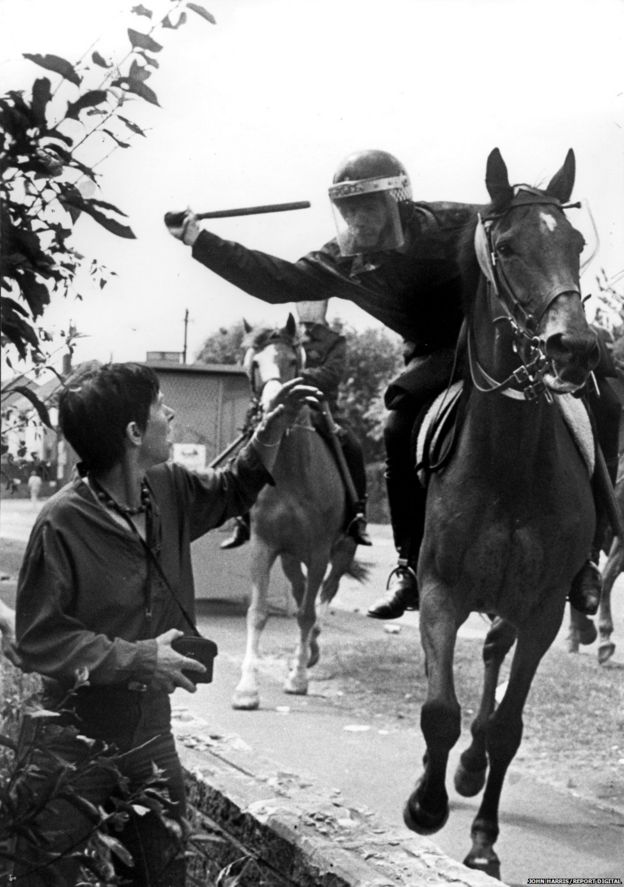Last night was the highlight of my Christmas; we watched 'Pride', a film about the Miners Strike of 1984 and the response from the Lesbian and Gay movement in London.
The film came out last year and back then I didn't feel able to go and see it - too many memories, too emotional.
Back in 1984, courtesy of Mrs Thatcher, I was out of work for most of the year. When the Miners went on strike against her plans to close down the coal industry, I got fully involved; collecting money in buckets on the high street, standing outside shops appealing for tins of food, attending meetings and marches.
I was singing at the time with The Workers Music Association and spent the year doing benefits for strikers up and down the country (and it wasn't just the Miners who were striking) to raise money.
It was one of those hectic, amazing times when I was trying to juggle searching for a job with having no money and trying to change things as well. It was exhilarating and if nothing else it changed me for ever.
Anyway, to get back to the film; I wasn't the only one having those kind of experiences. The National union of Miners had had its funds sequestered by the Thatcher Government and it's bank accounts frozen. Effectively any money raised and passed on to them through normal, legitimate channels would be seized. There was no strike pay for the families and children.
Up and down the country all kinds of people set up Miners Support groups to raise money and it was no different at the Gay Pride march in 1984; Mark Ashton, Mike Jackson and a small group of friends started collecting money in buckets and out of that grew an organisation; LGSM - "Lesbian and Gays Support the Miners".
This turned out to be one of the most successful groups of it's kind; the attacks on the Miners by the Government, press and the police rang a bell with Gay people who had also known what oppression was like.
Much of the film is spent charting the LGSM's at first difficult time getting acceptance from the close knit and very traditional mining community they adopted in The Dulais valley in South Wales. It's a very funny, very human film.
I got very emotional and at certain points quite upset. In one scene two characters are making sandwiches for a social - margarine and nothing else. In another, one of the prizes in the bingo at the Miners Welfare was a tin of corned beef.
I well remember we rang the Kent Coalfield because most of the food donations we were getting were baked beans and we weren't sure they'd want them; they told us they were desperate.
Back in 1984 I was unaware of the LGSM but if I'd heard of it, it wouldn't have surprised me as I'd had a lot to do with the Gay community and their struggles in the 1970's.
These days 'Pride' is a massive carnival and celebration, paid for by corporate sponsorship and with Tory politicians falling over themselves to be associated with it.
Back in the 1970's it was a small, unpopular protest march, always at danger of being attacked. Every year a call would go out for people like me to come and support the march and help protect it from physical attack.
At the time I was pleased to help out and I attended 3 or 4 of the marches at the end of the 1970's.
Now, every year when the glossy, glitzy 'Pride' takes place I think back to those days with my own personal pride that I was a small part of that struggle back in the early days.
Anyway the film ends with the defeat of the Miners; a setback that allowed Thatcher free to ruin this country, to sell off its assets and reward her rich and powerful supporters who became billionaires as a result.
The lesson of the strike is simple; don't lose. We weren't tough enough or ruthless enough to win.

And as I wrote when Robyn and me took a day trip to South Wales, most traces of the mining industry have now been wiped off the face of the earth. It's as though they don't want anyone to remember what happened.
Which makes this film all the more important.
I'll end with this amazing photo from the front of 'Pride 2015', to mark the release of the film and which is led by two proud banners;
On the left is the original LGSM banner from The Miner's Strike while on the right is an image taken from Mark Ashton's panel on the UK Aids Memorial Quilt.
Mark, who continued to be an active communist after the strike, died of Aids 12 days after he was diagnosed in 1987.
Neil Harris
(a don't stop till you drop production)
Home: helpmesortoutstpeters.blogspot.com
Contact me: neilwithpromisestokeep@gmail.com

No comments:
Post a Comment